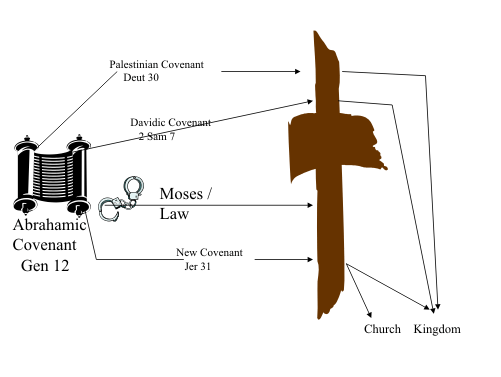New Testament Survey
Covenants

15 And for this cause he is the mediator of the new testament, that by means of death, for the redemption of the transgressions that were under the first testament, they which are called might receive the promise of eternal inheritance. 16 For where a testament is, there must also of necessity be the death of the testator. 17 For a testament is of force after men are dead: otherwise it is of no strength at all while the testator liveth.
Hebrews 9:15-17

Covenants
The Bible, if you think about it carefully, really teaches us only two things.
First, the Bible teaches us How to Find God.
Second, the Bible teaches us How to Live once we have found Him.
The Old Testament is primarily the story of man’s efforts at attempting to find God. It is true the occasional Old Testament hero discovers true fellowship with God. Such a hero is, however, the exception to the rule. The Old Testament is primarily about the relationship between God and the Nation of Israel. As God deals with the Nation, the Old Testament reflects a group of people who never grasp this concept of true fellowship for any length of time. As a result, the Nation walks without the power and wisdom and peace which only come from true fellowship with God.
The entire relationship of the Nation of Israel with God is initially based upon the Abrahamic Covenant. This unconditional promise is made by God to Abraham in Genesis 12:1-3. There are several promises contained in this covenant. Some are to Abraham personally, others to his offspring. Note especially three of these.
- First is the promise of the people and land. This is reflected in more detail in the Palestinian Covenant given in Deut 30. This is a promise to the Nation of Israel and has not yet been fulfilled.
- Second is the promise of a king. This is given in greater detail in the Davidic Covenant found in 2 Sam 7:5-16. This promise also has not yet been fulfilled in an earthly sense.
- Third is the promise of peace with God and blessings on the Gentiles. This covenant is reflected in the New Covenant stated in Jeremiah 31:31-34. This is the condition of God’s law being written on the heart of the God’s people. This is the promise which flows to the Gentiles and is currently found in God’s people, the Church of Jesus Christ. It has not been fulfilled in so far as the Jewish Nation is concerned.
Note that there is no mention in the Abrahamic covenant of the law (Exod 20:1-17). The giving of the law is called the Mosaic covenant and is not part of the blessings seen in the New Covenant when God’s law is written on the hearts of the people and not on tablets of stone.
The following diagram shows the relationship of the Nation of Israel, the Church and the covenants in picture form..

The Old Testament, then, is the ground of preparation for the coming of Christ.
What needs to be gleaned from all of this is the place of the New Testament in this scheme. If the Bible teaches man how to find God and then how to live, where does the New Testament fit?

The word translated “testament” may also be translated “covenant.” In other words, the title of the second part of God’s Holy Book could be called the New Covenant. This is because Jesus Christ fulfilled all of the requirements set forth in the Old Testament as being necessary to find God. Fulfillment becomes a major theme of the New Testament. Indeed, for our purposes, the New Testament is the fulfillment and answer of the first question, namely, HOW TO FIND GOD. Then, as if this is not enough, the New Testament continues on to teach us HOW TO LIVE as part of God’s family.
This is possible because all of Scripture is about or points to Jesus Christ. Since the New Testament is about Jesus, God come to earth as man, it is easy to see how the New Testament is designed to answer the two questions necessary for man to have a proper relationship with God. Just as it was necessary for God to come to earth to bring man back into fellowship with Him, so, too, is it necessary for God to provide each succeeding generation with this same information. The prophets are gone. They have been replaced by the New Testament.
